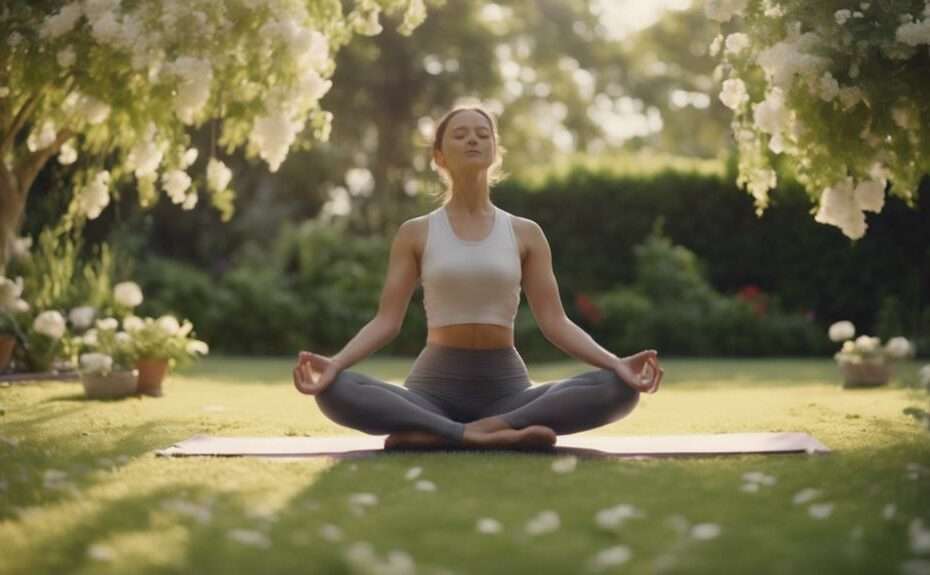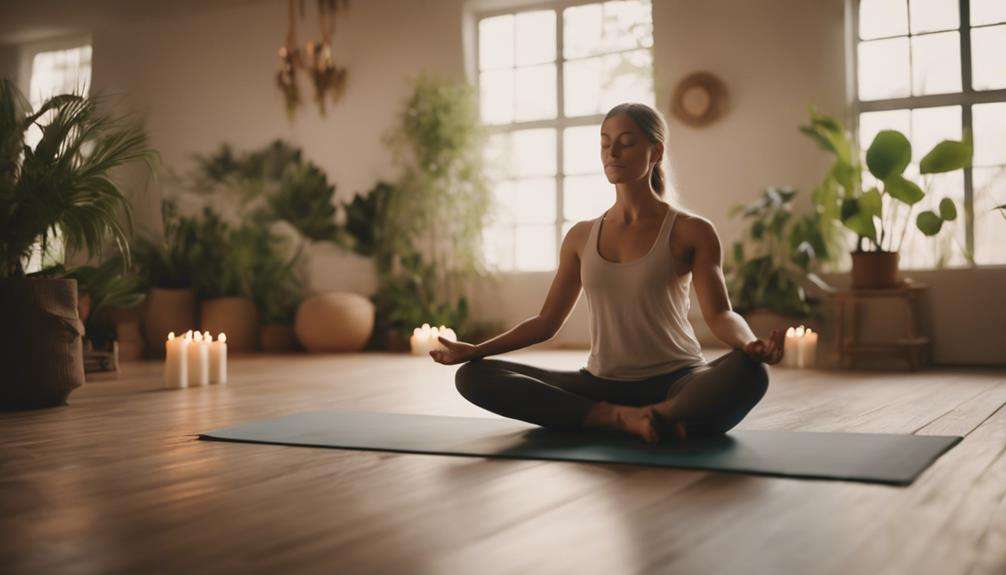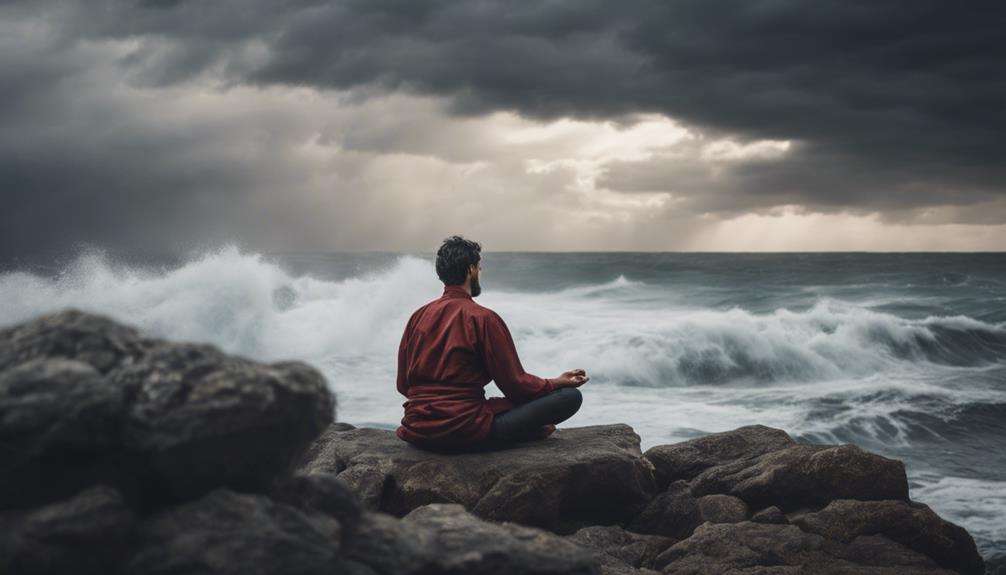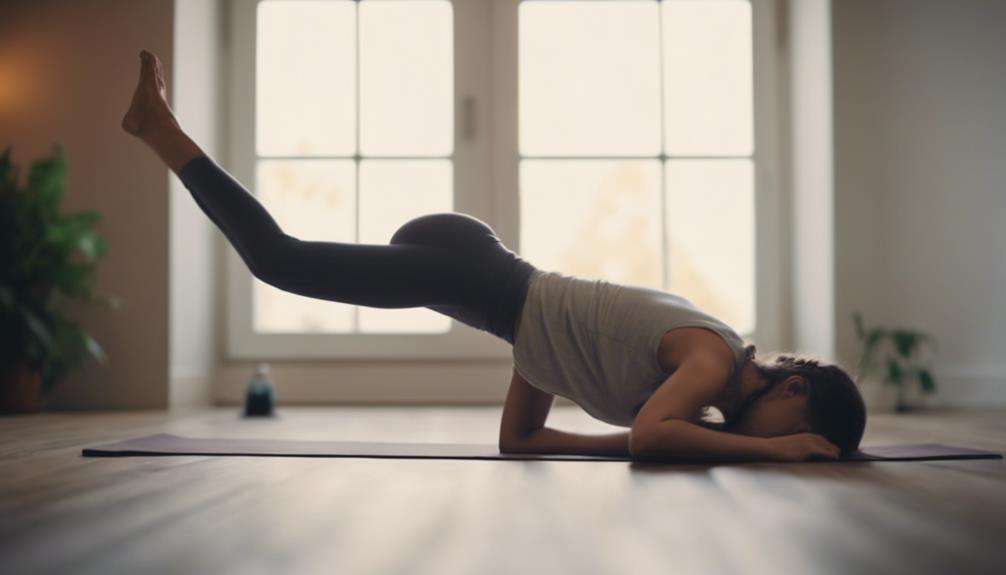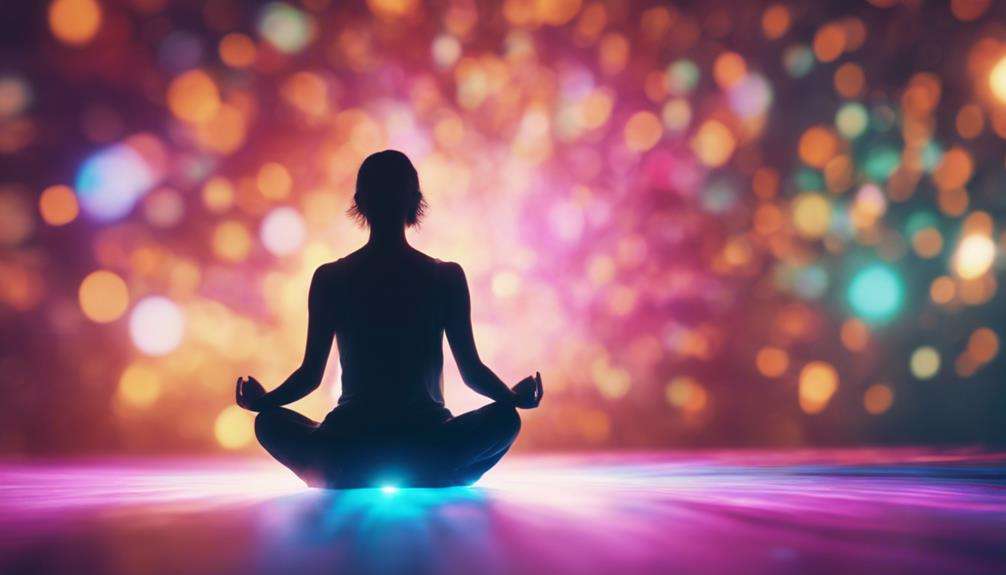Imagine a scenario where a busy professional feels overwhelmed by work deadlines and personal responsibilities, leading to persistent feelings of stress and anxiety.
In such a situation, the exploration of yoga therapy as a tool for stress management and anxiety relief becomes crucial. By understanding how yoga practices can positively impact mental well-being, individuals can discover effective strategies to navigate through challenging times.
The integration of yoga therapy into daily routines offers a promising pathway towards cultivating inner peace and resilience.
Key Takeaways
- Yoga therapy combines postures, breathwork, and mindfulness for stress reduction.
- Tailored yoga practices address individual anxiety triggers effectively.
- Breathwork in yoga regulates the body's stress response system for relaxation.
- Mindfulness techniques promote emotional regulation and lower cortisol levels.
Understanding the Impact of Stress
Understanding the impact of stress on your body and mind is crucial for managing anxiety effectively. When stress takes a toll on your well-being, it can disrupt the natural balance of your body and activate the sympathetic nervous system, leading to a cascade of physical and mental health issues, including anxiety disorders. Chronic stress can significantly diminish your overall quality of life, making stress management an essential aspect of maintaining your health.
Recognizing stress triggers and implementing effective coping strategies are key components of anxiety relief. By acknowledging the detrimental effects stress can have on your body and mind, you can take proactive steps to mitigate these impacts. One powerful method for managing stress and anxiety is through yoga therapy. Yoga combines physical postures, breathing exercises, and mindfulness techniques to help reduce stress levels, promote relaxation, and enhance overall well-being. Incorporating yoga into your routine can provide you with valuable tools to combat stress and cultivate a sense of calmness and resilience in the face of life's challenges.
Managing Stress Through Yoga
Curious about how yoga can help you manage stress more effectively? Yoga therapy offers a holistic approach to stress relief and anxiety management. By incorporating specific yoga techniques, individuals can pinpoint triggers of anxiety and develop effective strategies for handling them. Through regular practice, yoga aids in regulating the body's stress response system, leading to increased resilience in facing challenging situations.
One of the significant advantages of yoga therapy is its ability to provide personalized treatment for stress relief. Tailoring the practice to suit the severity of anxiety allows for a targeted approach, addressing individual needs and promoting overall well-being. When combined with traditional treatments, yoga therapy can enhance stress and anxiety management, offering a comprehensive and integrative solution for those seeking relief.
Incorporating yoga into your routine not only fosters physical well-being but also nurtures mental and emotional health, providing a space for self-reflection and relaxation. Embrace the power of yoga as a tool for managing stress and cultivating a sense of inner peace.
Importance of Breathwork in Stress Relief
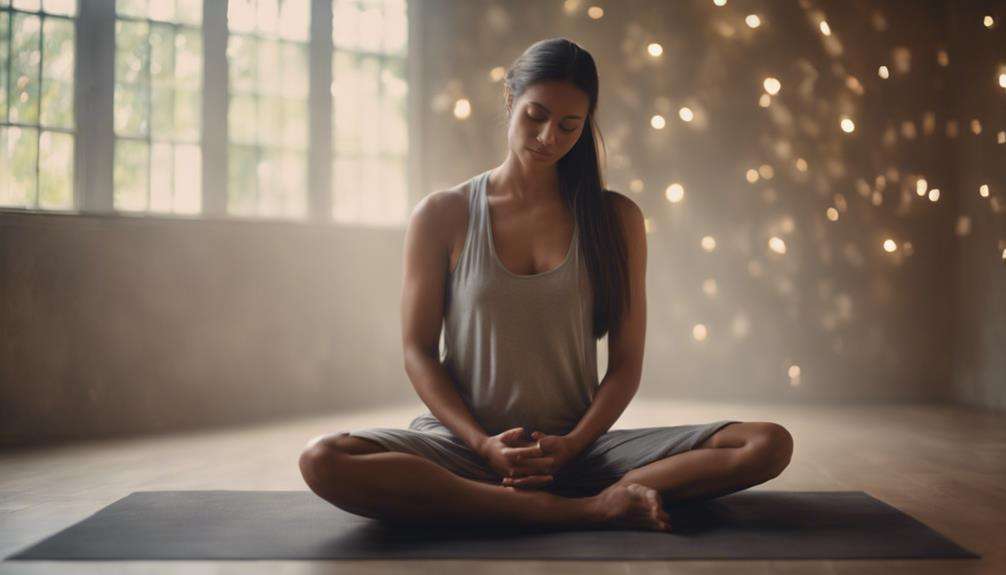
To effectively manage stress and anxiety, incorporating breathwork techniques in your yoga practice plays a crucial role in promoting relaxation and overall well-being. In yoga, the practice of Pranayama focuses on regulating breathing patterns to calm the sympathetic nervous system, which is responsible for the body's fight-or-flight response. Deep, steady breathing through Pranayama techniques can be particularly beneficial for anxiety relief, as it helps to induce a state of calmness and relaxation.
When you engage in breathwork during your yoga sessions, you're actively influencing your heart rate variability by stimulating the vagus nerve. This stimulation has a direct impact on your body's stress response, helping to reduce the symptoms of anxiety. By incorporating breath practices into your yoga routine, you can effectively modulate your stress response and promote a sense of calm and tranquility in both your body and mind.
Mindfulness Practices for Stress Reduction
If you're feeling overwhelmed by stress, practicing mindfulness techniques like deep breathing and body scan meditations can offer you a sense of calm and focus in the present moment.
These practices are known to lower cortisol levels, the body's stress hormone, helping you manage anxiety more effectively.
Deep Breathing Techniques
Deep breathing techniques, such as pranayama in yoga, offer a powerful approach to regulating breathing patterns for calming the sympathetic nervous system and reducing stress and anxiety. When you practice pranayama, you engage in a mindful breathing exercise that can have a profound impact on your overall well-being.
Here are some key benefits of incorporating deep breathing techniques into your daily routine:
- Enhances relaxation and reduces anxiety levels
- Stimulates the vagus nerve for increased heart rate variability
- Induces a sense of calmness and relaxation
- Influences heart rate variability for stress relief
- Supports self-regulation and mindfulness practices
Body Scan Meditation
Engage in a body scan meditation to cultivate mindfulness and reduce stress levels effectively. This mindfulness practice involves systematically focusing on each part of your body, from head to toe.
By bringing attention to different sensations and areas of tension, you can increase body awareness and promote relaxation. Whether you choose to do it lying down or sitting comfortably, the goal remains the same: to guide your awareness through your body with intention.
Body scan meditation is a powerful tool for managing anxiety and enhancing overall well-being. Research indicates that this practice can improve sleep quality, reduce anxiety levels, and help regulate emotions.
Dedicate a few moments to this practice regularly to experience the calming effects of body scan meditation.
Yoga Poses for Relaxation

To achieve a state of deep relaxation and stress relief, incorporate specific yoga poses that target different areas of the body for effective tension release. Here are some yoga poses that can help you unwind and relax:
- Seated Neck Stretch: This pose helps release tension in the neck, promoting relaxation and stress relief.
- Cat Pose and Cow Pose: By enhancing spine flexibility, these poses induce a state of relaxation.
- Half Splits, Seated Forward Bend, Constructive Rest, Supine Spinal Twist, and Corpse Pose: These poses offer deep relaxation and stress relief.
- Targeted Areas: Specific yoga poses target different areas of the body to release tension and promote relaxation.
- Yoga Sequences: Incorporating gentle movements and specific poses in yoga sequences can aid in stress relief and relaxation.
Incorporating Meditation for Calmness
Enhance your relaxation practice by incorporating meditation techniques to cultivate a sense of calmness and inner peace.
Meditation plays a crucial role in reducing stress and anxiety by enhancing self-regulation and mindfulness.
Research has shown that meditative therapies effectively alleviate symptoms of anxiety, promoting a state of relaxation and tranquility.
Through mindfulness in movement and meditation, individuals can learn to watch their thoughts, fostering inner calmness and emotional balance.
Creating a Relaxing Environment
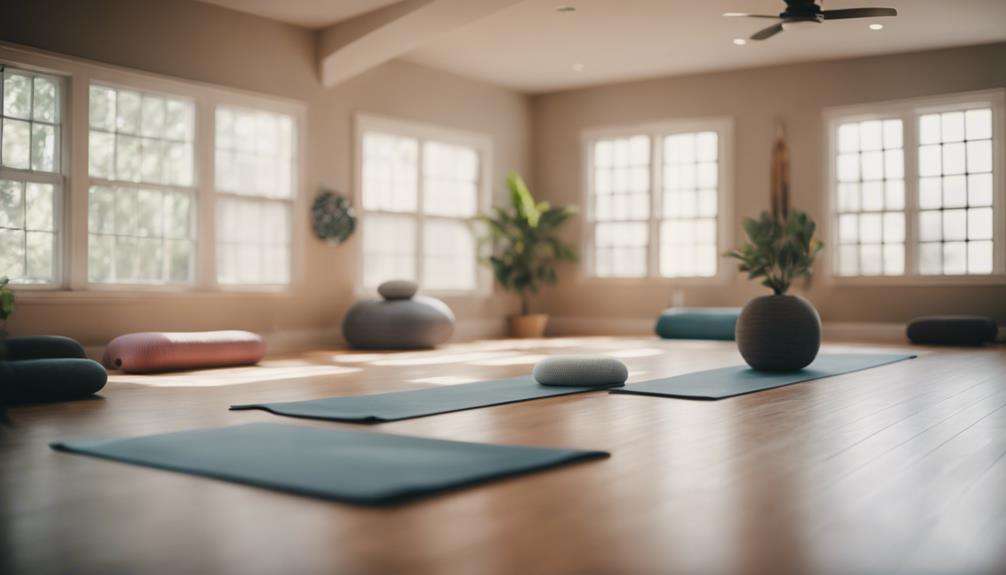
To create a serene and conducive environment for your yoga therapy practice, focus on minimizing distractions and incorporating elements that promote relaxation and tranquility. Soft lighting, calming colors, and soothing music can enhance the ambiance for stress and anxiety relief during yoga practice. Incorporating elements like essential oils, candles, or incense can further promote relaxation and a sense of calm in the environment. Decluttering the space and adding personal touches like plants or meaningful decorations can create a peaceful atmosphere conducive to wellness activities. A designated area free from disruptions or noise can help individuals focus on their yoga practice and effectively manage stress and anxiety.
- Minimize Distractions: Ensure a quiet space free from interruptions.
- Comfortable Seating: Use supportive cushions or yoga mats for relaxation.
- Soft Lighting: Opt for gentle, warm lighting to create a cozy atmosphere.
- Calming Colors: Choose soothing hues like blues or greens to promote relaxation.
- Personal Touches: Add plants or meaningful decorations to personalize your space.
Holistic Wellness Approach to Stress
When it comes to managing stress, a holistic wellness approach focuses on nurturing your mind-body connection and utilizing breathwork techniques.
These practices not only help in relieving stress but also promote emotional balance and overall well-being.
Mind-Body Connection
In yoga therapy for stress and anxiety, the holistic wellness approach emphasizes the vital connection between the mind and body for effective relief. This mind-body connection is a cornerstone of yoga's holistic approach to stress management, recognizing the interplay between mental, emotional, and physical well-being. Here are five key aspects of this integrated approach:
- Yoga therapy promotes inner peace and calmness, fostering personal growth.
- It addresses all facets of health—mental, emotional, and physical—in a unified manner.
- By encouraging conscious living, yoga supports overall well-being and reduces suffering.
- The mind-body unity in yoga complements modern medicine by focusing on holistic healing.
- Integrated practices in yoga help alleviate stress and anxiety through a balanced approach to wellness.
Breathwork Techniques
Embracing breathwork techniques in yoga therapy for stress and anxiety allows for a profound exploration of how controlling your breath can serve as a powerful tool in promoting holistic wellness and alleviating symptoms of distress. Through practices like Pranayama, which regulate breathing patterns, you can calm the sympathetic nervous system and reduce stress effectively. Deep and steady breathwork not only influences heart rate variability but also proves effective for anxiety relief.
Certain breath practices stimulate the vagus nerve, promoting relaxation and reducing anxiety symptoms. By incorporating breathwork techniques into your yoga routine, you can modulate the stress response, fostering a sense of calmness. These techniques enhance mindfulness, self-regulation, and overall stress relief, offering a holistic approach to managing anxiety.
Frequently Asked Questions
What Is the 3 3 3 Rule for Anxiety?
When anxiety hits, remember the 3 3 3 rule. Notice three things, name three sounds, and move three body parts. This technique grounds you in the moment, shifts focus away from anxious thoughts, and promotes relaxation.
Which Type of Yoga Is Best for Stress and Anxiety?
For stress and anxiety relief, Hatha yoga's slow pace aids in calming the mind, while Vinyasa's flow can energize you. Yin Yoga's deep stretches offer relaxation, and Kundalini Meditation provides mental clarity. Choose what resonates with you most.
Does Yoga Therapy Help With Anxiety?
Yes, yoga therapy helps with anxiety by strengthening the mind-body connection, utilizing breathing techniques for calm, and promoting self-care practices. It's a proven method to manage stress and anxiety effectively for overall well-being.
What Are 3 Coping Strategies for Anxiety?
When dealing with anxiety, try meditation techniques for mental peace, deep breathing exercises to calm your nerves, and progressive muscle relaxation to release tension. Incorporating mindfulness practices and grounding techniques can also help manage stress effectively.
Conclusion
You've unlocked the secret to ultimate stress relief with yoga therapy!
Picture yourself floating on a cloud of tranquility, surrounded by a sea of calmness.
With each breath, you release all tension and worries, feeling light as a feather.
Embrace the power of yoga to transform your mind and body, leading you on a journey to inner peace and well-being.
You deserve this blissful escape from the chaos of daily life.
Namaste.
